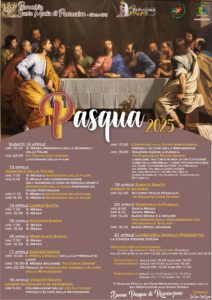– EASTER 2025 – Click on the photo to enlarge
Click on the photo to enlarge
HOLY THURSDAY (MASS IN THE LORD'S SUPPER– With. Liturgical: White
Comment on the Gospel of Holy Thursday
GEsù spends the last hours of his earthly life in the company of his disciples. The Master manifests an extraordinary love for the apostles, giving them teachings and recommendations. During the Last Supper, Jesus showed – with his words – the infinite love he had for his disciples and gave him eternal validity by instituting the Eucharist, making a gift of oneself: he offered his Body and Blood in the form of bread and wine to become spiritual food for us and sanctify our body and soul. He expressed his love in the pain he felt when he announced his near betrayal to Judas Iscariot and their weakness to the apostles.. He made his love felt by washing the apostles' feet and allowing his beloved disciple, Giovanni, to lean against his chest. In his public life, Jesus has recommended more than once to his disciples not to try to occupy the first place, but rather to aspire to humility of heart. He said and repeated that his reign, that is, the Church, it must not be in the image of earthly kingdoms or human communities in which there are first and last ones, of the rulers and the governed, of the powerful and the oppressed. On the contrary, nella sua Chiesa, those who are called to rule must in reality be at the service of others; because the duty of every believer is not to seek out appearances, but the inner values, not to worry about the judgment of men, but of that of God.
Despite the clear teaching of Jesus, the apostles continued to dispute the first places in the Kingdom of the Messiah.
During the Last Supper, Jesus was not satisfied with words, but he set the example by washing their feet. It, after you finish, he said: “You call me Master and Lord and you say well because I am. So if I, the Lord and the Teacher have washed your feet, you too must wash each other's feet " (Gv 13,13-14).
The Supper is repeated over the centuries. In fact, Jesus invested the apostles and their successors with the power and duty to repeat the Eucharistic Supper in the Holy Mass.
Christ sacrifices himself during Mass. But, to take up the words of St. Paul, he remains the same “yesterday, today and always " (Eb 13,8).
Believers who participate in the Eucharistic Sacrifice change, but their behavior towards Christ is more or less the same as that of the apostles at the time of the Supper. There have been and still are saints and sinners, of the faithful and traitors, of martyrs and renegers.
We turn our gaze to ourselves. Who we are? What is our behavior towards Christ? God save us from having anything in common with Judas, the traitor. May God allow us to follow St. Peter on the path of repentance. Our deepest desire, however, must be to have the fate of St. John, to be able to love Jesus in such a way that he allows us to lean on his chest and hear the beating of his heart full of love; to reach the point that our love is united with his in a way that we can say with Saint Paul: “It is no longer I who live, but Christ lives in me " (Gal 2,20).